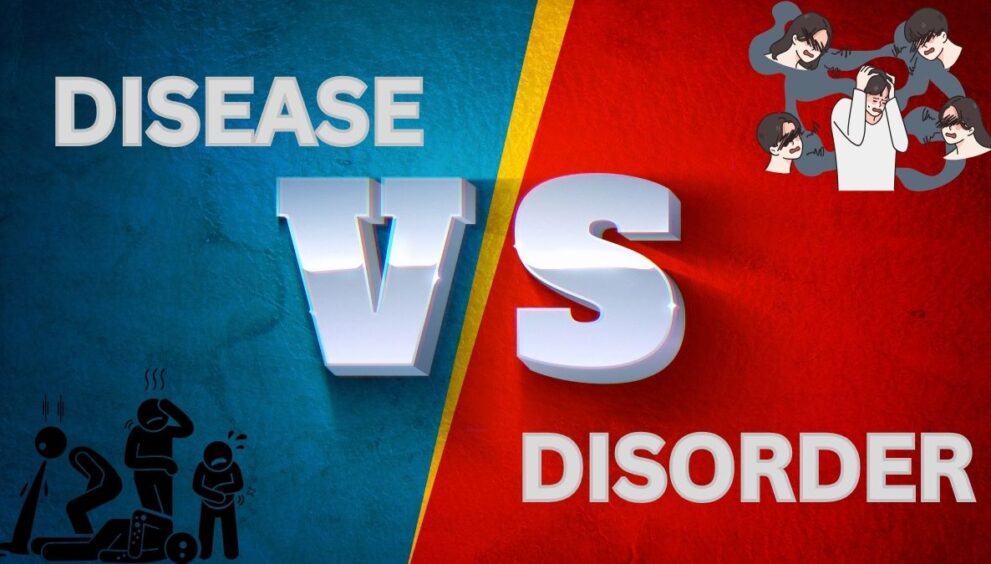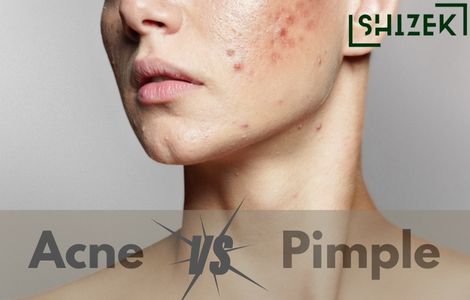Difference Between Disease and Disorder

The main difference between disease and disorder is that a disease is usually characterized by specific symptoms and signs. In contrast, a disorder refers to an abnormal condition that doesn’t necessarily have specific symptoms.
Diseases are often associated with specific causes and are diagnosable. Meanwhile, disorders may not have a clear cause and can encompass a broader range of conditions.
Table of Content
- Difference Between Disease and Disorder
- What is a Disease?
- What is a Disorder?
- Key Differences Between Disease and Disorder
Difference Between Disease and Disorder
For better clarity, let’s explore the difference between disease and disorder in a tabular format:
| Aspect | Disease | Disorder |
|---|---|---|
| Definition | A specific, identifiable medical condition | A general disruption of normal functioning |
| Examples | Influenza, diabetes, cancer | Anxiety disorder, sleep disorder, ADHD |
| Cause | Usually has a known, specific cause | Often has multiple or unclear causes |
| Etiology | Typically pathological (e.g., infection, cellular abnormality) | Can be physiological, psychological, or behavioral |
| Diagnosis | Typically diagnosed through specific tests or criteria | Often diagnosed based on a set of symptoms or behaviors |
| Diagnostic tools | Lab tests, imaging, biopsies | Behavioral assessments, psychological evaluations |
| Treatment | Usually treated with targeted medications or interventions | Often managed with a combination of therapies and lifestyle changes |
| Treatment focus | Often aims to cure or manage the condition | Typically focuses on symptom management and improving function |
| Progression | Often follows a predictable course | May have a more variable or chronic nature |
| Prognosis | Can often be predicted based on the disease type and stage | More variable and dependent on individual factors |
| Scope | Typically affects specific organs or systems | Can affect physical, mental, or behavioral processes |
| Duration | May have a defined course with a beginning and end | Often chronic or long-lasting |
| Impact on life | Can be acute or chronic, often with physical symptoms | Usually chronic, affecting daily functioning and quality of life |
| Genetic factor | Often has a clear genetic component | May have genetic predisposition, but environmental factors play a larger role |
| Contagiousness | Some diseases are contagious | Disorders are not contagious |
| Social perception | Generally viewed as a medical issue | May face more stigma due to misunderstanding |
What is a Disease?
According to the World Health Organization (WHO), a disease is an abnormal condition that negatively affects the structure or function of a part or all of an organism, and it is not due to any immediate external injury.
Diseases are often construed as medical conditions that are associated with specific symptoms and signs. Examples of diseases include influenza, diabetes, cancer, tuberculosis, and Alzheimer’s disease.
Must Explore: Difference Between Zygote and Foetus
What is a Disorder?
The term “disorder” generally refers to a disturbance or abnormality in the function or structure of a person’s body, mind, or social relationships. In a medical context, it often refers to a physical or mental condition that causes distress, dysfunction, or impairment in daily life.
Attention Deficit Hyperactivity Disorder (ADHD) is a common neurodevelopmental disorder that affects both children and adults.
Must Read: Difference Between Medical Hand Washing and Surgical Hand Washing
Key Differences Between Disease and Disorder
Here are the key differences between disease and disorder:
- A disease is a specific, identifiable condition (e.g., influenza, diabetes), whereas a disorder is a more general disruption of normal functioning (e.g., sleep disorder, anxiety disorder).
- A disease usually has a known cause (e.g., bacteria, viruses, genetic factors), but a disorder often has multiple or unclear causes.
- Diseases can be diagnosed through specific tests or criteria. In contrast, disorders are often diagnosed based on a set of symptoms or behaviours.
- A disease is usually treated with targeted medications or interventions, but a disorder is often managed with a combination of therapies and lifestyle changes.
- Diseases often follow a predictable course, whereas disorders may have a more variable or chronic nature.
Must Explore Articles:
How Does The Biological Clock Tick?
























































































































